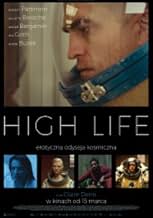Um pai e sua filha lutam para sobreviver no espaço profundo, onde vivem isolados.Um pai e sua filha lutam para sobreviver no espaço profundo, onde vivem isolados.Um pai e sua filha lutam para sobreviver no espaço profundo, onde vivem isolados.
- Prêmios
- 5 vitórias e 22 indicações no total
André 3000
- Tcherny
- (as André Benjamin)
Enredo
Você sabia?
- CuriosidadesRobert Pattinson already knew 13-month-old Scarlett Lindsey, who plays his baby daughter Willow: She is the daughter of his longtime friend, musician Sam Bradley, whom he knows since their school days together in London. Identical twin girls were initially cast, but as late as two days before filming was about to start, Pattinson couldn't bond with them, as they wouldn't stop crying as soon as he picked them up and got upset every time they were without their mother. He and Claire Denis felt not ready to shoot with them because the final film would have ended up entirely different. The night before filming began, Pattinson had the idea to ask his friend the last minute and so they flew in from London the next morning. She actually took her first steps ever infront of the camera while filming.
- Erros de gravaçãoEarly in the movie Pattinson dumps bodies into space, and they fall downwards. This is consistent with the principle expressed in the beginning that the ship accelerates at a constant rate of 1 G, creating artificial gravity and thus making things appear to "fall" due to inertia. The same goes for the scene where Monte drops the wrench over the side of the ship.
- Citações
Tcherny: "I'd rather sink into the Earth after I've lost you than to sit around and grieve once you've gone off into your destiny."
Monte: What are you talking' about?
Tcherny: It's what my wife told me. I told her I was doing all this for her and our son, to turn our shame into some type of glory, you know? She says that this mission was like burying her twice and that my idea of glory was bullshit.
- Cenas durante ou pós-créditosThe title appears almost 18 minutes into the movie.
- ConexõesFeatured in WatchMojo: Top 10 Best Movies of 2019 (So Far) (2019)
- Trilhas sonorasWillow
Written by Stuart Staples and Dan McKinna
Sung by Robert Pattinson
Performed by Tindersticks
Published by BMG Rights Management (UK) Ltd
2018 Lucky Dog Inc.
Avaliação em destaque
A science fiction thriller from Claire Denis? The uncompromising darling of French art house cinema, adored by critics and met with general puzzlement by audiences? And it's in English? And it stars the guy from Crepúsculo (2008)? You have to be making this up.
Not at all. However, as intriguing as that may sound, it's a deceptive overview. Yes, it is Denis's first English-language film, and yes, it is set in space, but it's a science fiction film in name only, and has more in common with 2001: Uma Odisséia no Espaço (1968) and Solaris (1972) than with anything in the Star Trek or Star Wars franchises. And just for the record, the guy from Twilight has developed one of the most eclectic recent CVs of any actor in Hollywood. The long and short of it is that Denis has not sold out, and High Life is as multiplex-friendly as anything in her oeuvre (which is to say, not in the slightest), covering several of her more familiar themes - the darker aspects of desire; the notion of being an outcast; parenthood; the inescapability of death; the beauty of the human body; the relationship between violence and sexuality. The presence of Robert Pattinson will probably draw in a lot of unsuspecting folks, who will have no idea what to make of Denis's slowly paced existential musings, resulting in a slew of "worst film ever" reviews. But although it's not Denis's best (that remains either Bom Trabalho (1999) or Bastardos (2013)), it's a fascinatingly poetic and original film that is utterly uncategorisable - a space thriller about a mission collapsing in on itself; an ecological allegory positing that we don't have a huge amount of time left to save the planet; an analysis of the psychological ramifications of long-term incarceration; an erotic skin flick obsessed with bodily fluids; a metaphor for the perils of imperialism; a fable on the subject of paternity; a story about loneliness and grief; a literalisation of the premise that no amount of evolution, philosophy, or esotericism can ever change the fact that we're biological organisms controlled by our sexual yearnings and impulse to procreate - desire will always trump the social contract; we can place as much artificial limitation on our carnality as we want, but ultimately, desire will betray us.
Like I say, very multiplex-friendly.
Deep space. On an unnamed ship marked only with the number #7, Monte (Pattinson) lives alone with his baby daughter Willow (Scarlett Lindsey). However, this wasn't always the case, and as the film begins, Monte is releasing the bodies of his deceased crewmates into the void of space. How this situation came to pass is revealed via an achronological flashback narrative structure. A group of death row were offered a pardon if they undertook a mission to investigate the viability of the "Penrose Process" - a theory developed by Sir Roger Penrose whereby energy could be extracted from the area close to a black hole. However, the groups' de facto leader, Dr. Dibs (an ethereal Juliette Binoche oozing uninhibited sexuality from every pore), a criminal herself, is using the journey to conduct biological experiments on the crew; harvesting the men's semen and attempting to artificially inseminate the women. Monte, however, refuses to comply, arguing that his chastity gives him strength. His obstinacy fascinates Dibs, who determines to get a sample from him by any means necessary.
High Life, written in French by Denis and her regular writing partner Jean-Pol Fargeau in 2013 and translated into English by Geoff Cox, begins with pseudo-Edenic shots of lush vegetation, before slowly revealing we're seeing a garden on a spaceship, surrounded by and subservient to technology. We then hear a baby crying. This opening, mixing vegetation, technology, and biology, signals both the film's tone and demonstrates the economy of Denis's visual language, telling us much of what we need to know about the upcoming film. Denis and director of photography Yorick Le Saux employ similarly precise storytelling tools in shooting everything on the spaceship on HD video, whereas the few scenes on Earth are shot on 16mm - this gives the space scenes a sleek polished sheen, whilst the Earth material looks grainy and gritty, more lived in, setting up an instant visual contrast.
Thematically, rather unexpectedly, the film has a lot in common with Fé Corrompida (2017) ; both deal with the looming end of existence; both examine the possibility of finding hope amidst the oncoming cataclysm; both see the human race as essentially not worth saving; both focus on a spiritual character facing a crisis of faith - in First Reformed, that crisis concerns Fr. Toller's Catholicism, whereas in High Life it's Monte's belief in the importance of self-discipline and chastity.
Of course, on a more prosaic level, the film is obsessed with sexuality. Fluids are a recurring motif throughout, whether the blood that several characters shed, the sperm with which Dibs is obsessed, the oil that keeps the ship's systems running, the water that nourishes the garden and that keep the crew alive. Speaking of fluid, perhaps the film's most haunting image is a shot of one character lactating; her body producing nourishment for a baby she can't feed, as Dibs has taken it from her, the milk running down her body going to waste. Interestingly enough, at the film's world première in Toronto, this scene sparked a considerable number of walkouts, almost every single one of which was male. Make of that what you will.
The subject of fluids is introduced from the onset. One of the first things we hear Monte saying is telling Willow that even if it is recycled, one should never eat one's own faeces or drink one's own urine, as such behaviour is "taboo". If we accept that the ship's garden is Eden, then Monte and Willow are our Adam and Eve, and, as we all know, what comes next in Genesis is temptation and desire. Thus Monte's emphasis on taboo in this opening scene becomes ironic given that later in the film, he will come face to face with an even more controversial taboo.
In terms of problems, the film will be far too abstruse for some. Denis obviously intended for High Life to be esoteric, and she's unconcerned with CGI spectacle or any of the tropes we've seen rehashed a million times in other sci-fi movies. For some, however, the film will cross the line from esotericism to impenetrability, with Denis allowing the socio-political themes overwhelm the film's identity as popular entertainment, refusing to explicitly reveal its fundamental meaning. And for those more used to films that openly reveal themselves without the audience having to put in much effort, High Life will prove too abstract.
In this sense, Denis's litany of themes does come across as a little haphazard, as she jumps around fairly randomly between them. This results in something of a thematic pile-up, which, by definition, can feel like a bit of a dead-end. I don't agree with people who say the film "has no point", but I can certainly see from where such criticism could arise, as Denis leaves several ideas frustratingly incomplete. Another issue is that the journey of #7 is never presented in any way urgently, meaning there's rarely tension, as life on ship moves along at its own lethargic pace. And I have to admit, at times my attention began to wander.
Nevertheless, High Life is a fascinating film that fits right into Denis's oeuvre. Although it recalls the clinical detachment of 2001 and the psychological intensity of Solaris, High Life is very much its own animal. Asking questions about our inability to recognise the oncoming extinction, it offers a savage and pessimistic corrective to the idealism of films such as Interestelar (2014) and Perdido em Marte (2015). Positing that mankind is a monster driven by its desires isn't going to earn Denis legions of new fans, but for those of us who were already on board, there's much to be relished here.
Not at all. However, as intriguing as that may sound, it's a deceptive overview. Yes, it is Denis's first English-language film, and yes, it is set in space, but it's a science fiction film in name only, and has more in common with 2001: Uma Odisséia no Espaço (1968) and Solaris (1972) than with anything in the Star Trek or Star Wars franchises. And just for the record, the guy from Twilight has developed one of the most eclectic recent CVs of any actor in Hollywood. The long and short of it is that Denis has not sold out, and High Life is as multiplex-friendly as anything in her oeuvre (which is to say, not in the slightest), covering several of her more familiar themes - the darker aspects of desire; the notion of being an outcast; parenthood; the inescapability of death; the beauty of the human body; the relationship between violence and sexuality. The presence of Robert Pattinson will probably draw in a lot of unsuspecting folks, who will have no idea what to make of Denis's slowly paced existential musings, resulting in a slew of "worst film ever" reviews. But although it's not Denis's best (that remains either Bom Trabalho (1999) or Bastardos (2013)), it's a fascinatingly poetic and original film that is utterly uncategorisable - a space thriller about a mission collapsing in on itself; an ecological allegory positing that we don't have a huge amount of time left to save the planet; an analysis of the psychological ramifications of long-term incarceration; an erotic skin flick obsessed with bodily fluids; a metaphor for the perils of imperialism; a fable on the subject of paternity; a story about loneliness and grief; a literalisation of the premise that no amount of evolution, philosophy, or esotericism can ever change the fact that we're biological organisms controlled by our sexual yearnings and impulse to procreate - desire will always trump the social contract; we can place as much artificial limitation on our carnality as we want, but ultimately, desire will betray us.
Like I say, very multiplex-friendly.
Deep space. On an unnamed ship marked only with the number #7, Monte (Pattinson) lives alone with his baby daughter Willow (Scarlett Lindsey). However, this wasn't always the case, and as the film begins, Monte is releasing the bodies of his deceased crewmates into the void of space. How this situation came to pass is revealed via an achronological flashback narrative structure. A group of death row were offered a pardon if they undertook a mission to investigate the viability of the "Penrose Process" - a theory developed by Sir Roger Penrose whereby energy could be extracted from the area close to a black hole. However, the groups' de facto leader, Dr. Dibs (an ethereal Juliette Binoche oozing uninhibited sexuality from every pore), a criminal herself, is using the journey to conduct biological experiments on the crew; harvesting the men's semen and attempting to artificially inseminate the women. Monte, however, refuses to comply, arguing that his chastity gives him strength. His obstinacy fascinates Dibs, who determines to get a sample from him by any means necessary.
High Life, written in French by Denis and her regular writing partner Jean-Pol Fargeau in 2013 and translated into English by Geoff Cox, begins with pseudo-Edenic shots of lush vegetation, before slowly revealing we're seeing a garden on a spaceship, surrounded by and subservient to technology. We then hear a baby crying. This opening, mixing vegetation, technology, and biology, signals both the film's tone and demonstrates the economy of Denis's visual language, telling us much of what we need to know about the upcoming film. Denis and director of photography Yorick Le Saux employ similarly precise storytelling tools in shooting everything on the spaceship on HD video, whereas the few scenes on Earth are shot on 16mm - this gives the space scenes a sleek polished sheen, whilst the Earth material looks grainy and gritty, more lived in, setting up an instant visual contrast.
Thematically, rather unexpectedly, the film has a lot in common with Fé Corrompida (2017) ; both deal with the looming end of existence; both examine the possibility of finding hope amidst the oncoming cataclysm; both see the human race as essentially not worth saving; both focus on a spiritual character facing a crisis of faith - in First Reformed, that crisis concerns Fr. Toller's Catholicism, whereas in High Life it's Monte's belief in the importance of self-discipline and chastity.
Of course, on a more prosaic level, the film is obsessed with sexuality. Fluids are a recurring motif throughout, whether the blood that several characters shed, the sperm with which Dibs is obsessed, the oil that keeps the ship's systems running, the water that nourishes the garden and that keep the crew alive. Speaking of fluid, perhaps the film's most haunting image is a shot of one character lactating; her body producing nourishment for a baby she can't feed, as Dibs has taken it from her, the milk running down her body going to waste. Interestingly enough, at the film's world première in Toronto, this scene sparked a considerable number of walkouts, almost every single one of which was male. Make of that what you will.
The subject of fluids is introduced from the onset. One of the first things we hear Monte saying is telling Willow that even if it is recycled, one should never eat one's own faeces or drink one's own urine, as such behaviour is "taboo". If we accept that the ship's garden is Eden, then Monte and Willow are our Adam and Eve, and, as we all know, what comes next in Genesis is temptation and desire. Thus Monte's emphasis on taboo in this opening scene becomes ironic given that later in the film, he will come face to face with an even more controversial taboo.
In terms of problems, the film will be far too abstruse for some. Denis obviously intended for High Life to be esoteric, and she's unconcerned with CGI spectacle or any of the tropes we've seen rehashed a million times in other sci-fi movies. For some, however, the film will cross the line from esotericism to impenetrability, with Denis allowing the socio-political themes overwhelm the film's identity as popular entertainment, refusing to explicitly reveal its fundamental meaning. And for those more used to films that openly reveal themselves without the audience having to put in much effort, High Life will prove too abstract.
In this sense, Denis's litany of themes does come across as a little haphazard, as she jumps around fairly randomly between them. This results in something of a thematic pile-up, which, by definition, can feel like a bit of a dead-end. I don't agree with people who say the film "has no point", but I can certainly see from where such criticism could arise, as Denis leaves several ideas frustratingly incomplete. Another issue is that the journey of #7 is never presented in any way urgently, meaning there's rarely tension, as life on ship moves along at its own lethargic pace. And I have to admit, at times my attention began to wander.
Nevertheless, High Life is a fascinating film that fits right into Denis's oeuvre. Although it recalls the clinical detachment of 2001 and the psychological intensity of Solaris, High Life is very much its own animal. Asking questions about our inability to recognise the oncoming extinction, it offers a savage and pessimistic corrective to the idealism of films such as Interestelar (2014) and Perdido em Marte (2015). Positing that mankind is a monster driven by its desires isn't going to earn Denis legions of new fans, but for those of us who were already on board, there's much to be relished here.
- Bertaut
- 5 de out. de 2020
- Link permanente
Principais escolhas
Faça login para avaliar e ver a lista de recomendações personalizadas
- How long is High Life?Fornecido pela Alexa
Detalhes
- Data de lançamento
- Países de origem
- Centrais de atendimento oficiais
- Idioma
- Também conhecido como
- На висоті
- Locações de filme
- Colônia, Alemanha(Medienparks NRW Studios)
- Empresas de produção
- Consulte mais créditos da empresa na IMDbPro
Bilheteria
- Orçamento
- € 8.000.000 (estimativa)
- Faturamento bruto nos EUA e Canadá
- US$ 1.225.852
- Fim de semana de estreia nos EUA e Canadá
- US$ 99.341
- 7 de abr. de 2019
- Faturamento bruto mundial
- US$ 2.133.033
- Tempo de duração1 hora 53 minutos
- Cor
- Proporção
- 1.66 : 1
Contribua para esta página
Sugerir uma alteração ou adicionar conteúdo ausente



































